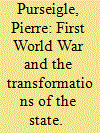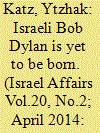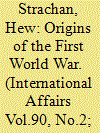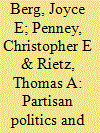|
|
|
Sort Order |
|
|
|
Items / Page
|
|
|
|
|
|
|
| Srl | Item |
| 1 |
ID:
131423


|
|
|
|
|
| Publication |
2014.
|
| Summary/Abstract |
Scholars of the First World War have long recognized the critical role played by the state in leading, organizing and managing the mobilization of belligerent societies, and the state's transformations have testified to the impact of industrialized warfare. Since the late 1980s, however, the cultural turn that largely accounts for the renewal and dynamism of First World War studies has shifted the emphasis away from the wartime state and its operations. Its study relatively suffered as a result. This article aims to bring the state back into the centre of the historiographical discussion, since its transformations testified to the nature and political impact of industrialized warfare. The article therefore focuses on three critical aspects of the relationship between state and society: the deployment of coercion, the expression of national solidarity and the redefinition of sovereignty. It demonstrates how the logic of mass participation in modern warfare transformed both the contours and the foundations of the state. To do so, the article draws on a renewed engagement with social scientific literature and the sociology of the state in particular.
|
|
|
|
|
|
|
|
|
|
|
|
|
|
|
|
| 2 |
ID:
131873


|
|
|
|
|
| Publication |
2014.
|
| Summary/Abstract |
This article examines the protest movement of the younger generation of Israeli songwriters and performers that emerged in response to the vicissitudes of the Arab-Israeli conflict over the past decades, notably the 1982 Lebanon war, the outbreak of the Palestinian intifada (December 1987), and Israel's unilateral disengagement from Gaza (2005). It argues that while this movement succeeded in inserting itself into the cultural and public arenas and shaking some of the unwavering beliefs and convictions held by the 'founding generation', its overall impact has remained limited.
|
|
|
|
|
|
|
|
|
|
|
|
|
|
|
|
| 3 |
ID:
131434


|
|
|
|
|
| Publication |
2014.
|
| Summary/Abstract |
The recent crop of books on the origins of the First World War dispenses with the notion of inevitability in the outbreak of war, and stresses the maturity of European civilization in 1914. They are in danger of prioritizing urban life over rural, civilization and culture over backwardness and superstition. They also say less than they might about the enduring place of war in international relations. The stress on contingency is to be welcomed for getting history away from the determinism of long-term trends, and for reopening the uncertainty of the outcomes still open to the Great Powers in 1914. However, the overall effect is cyclical. The prevailing wisdom on the reasons for war has reverted to the argument that 'Europe slithered over the brink', which dominated from the 1930s until the publications of Fritz Fischer in the 1960s. This does not mean that 'Fischerism', with its belief in German war guilt, is extinct. The challenge which now confronts historians, as they approach a four-year centenary, is to break this circularity and to explore new paths.
|
|
|
|
|
|
|
|
|
|
|
|
|
|
|
|
| 4 |
ID:
141820


|
|
|
|
|
| Summary/Abstract |
Using the Iowa Electronic Markets (IEM), this article assesses the political impact of several important events during the fall of 2013: the US government shutdown, the Senate elimination of filibusters for presidential nominations (i.e., the “nuclear option”), and the implementation of the Patient Protection and Affordable Care Act (i.e., ObamaCare). Did these events have meaningful effects on congressional control prospects in the 2014 election? According to IEM price changes, Republican chances fell dramatically when the government shut down, and they did not recover on resolution. Eliminating filibusters had a negative impact on Democratic chances. Various aspects of the ObamaCare rollout and reporting, as well as new announcements that incumbents would not run for reelection, had little effect. In contrast, the budget resolution reinforced the status quo. Overall, political rhetoric does not appear to affect congressional control prospects. Instead, actions matter: deliberate partisan actions of Congress adversely affect the initiating party’s prospects, whereas bipartisan initiatives help the party that initiates the bipartisan effort.
|
|
|
|
|
|
|
|
|
|
|
|
|
|
|
|
|
|
|
|
|